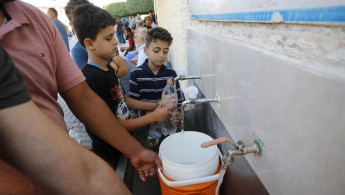Palestinians dispute Israel's claim of resuming water supply to Gaza Strip
Palestinians in the besieged Gaza Strip dispute Israel's claims that it resumed supplying water to the Palestinians in the coastal enclave under US pressure.
Since the launch of the new Israeli war on Gaza eleven days ago, the occupation government decided to tighten its illegal blockade and suspended supplying the territory with water and electricity supplies.
"Since then, we have never witnessed any water inside our homes," Mohammed al-Nakhala said to The New Arab. "[Israelis] completely destroyed our lives, not only our houses."
"We can barely take some water from the ground wells. We use a bucket tied to a long rope and lower it into the well to obtain a little water that could not be enough for one family too," he added.
On Sunday, 15 October, Israel claimed that it resumed the water supply to the southern Gaza Strip after intense pressure from the Biden administration. Israel has control of water sources, and Palestinian authorities must pay to be supplied.
Amna Mohammed, a woman based in Rafah, said, "Both Israel and the US are just liars as none of the Palestinians got any water or electricity."
"Israel has increased our suffering in Gaza, not merely through attacking our homes but also by imposing its illegal blockade on us without even taking care of our human rights as we have lived under the occupation for more than 70 years," the mother of four said.
To get some water, thousands of Palestinians in the coastal enclave, mainly in the southern parts of Gaza, are forced to wait hours in long queues to buy salty, undrinkable water.
"Previously, we used to obtain such kind of water freely as the municipalities supplied our houses with it, but now we pay about US$30 to get 1,000 litters of water," Salim al-Farra, a Khan Younis-based man, said to TNA.
Al-Farra stressed that Israel's claims "were wrong, and Israel is trying to market itself to the world as a state that respects the human rights in Gaza."
"If the current crises continue, we will absolutely die from thirst and hunger because of the lack of the basic supplies for our normal life," the middle-aged said.
Many other communities in Gaza are now forced to use unclean water from wells, which increases the risk of the spread of transmitted diseases, especially with the electricity outage, which has contributed to the shortage of water supplies and lack of treatment for the water, according to UNRWA Commissioner-General Philippe Lazraini.
He warned of the danger of cutting off water to Gaza, stressing that it is necessary for fuel to be delivered to Gaza to allow pumping systems to supply water for two million people.
Similarly, the spokesperson for the Hamas interior ministry, Eyad Al-Bozom, said on Monday that Israel had not permitted water supplies to be turned back on in Gaza, as had been reported by the international press.
"The residents drink unhealthy water, posing a serious health crisis threatens the lives of the citizens," he added.
During regular times, the coastal enclave depends on Israel for a third of its available drinking water, the Gaza Water Authority says.
Groundwater is the primary source in the Gaza Strip for the population to meet their water needs for various purposes, whether human, agricultural or industrial, according to the Water and Environmental Quality Authority in the Palestinian Territories.
The sector contains groundwater sources, but many wells were destroyed due to pollution or dried up and damaged due to years of overuse, according to a previous report by the Washington Post.
According to the World Health Organisation, the water quality in Gaza is "severely deficient" due to increasing salinity, contamination with some pollutants, and insufficient treatment options.
More than 90 per cent of the water in Gaza's only aquifer is no longer suitable for drinking.
Other water sources include desalination or wastewater treatment plants, but they stopped working after Israel cut off electricity to the Strip in an act that many legal experts are calling "collective punishment" and a "war crime".





 Follow the Middle East's top stories in English at The New Arab on Google News
Follow the Middle East's top stories in English at The New Arab on Google News


